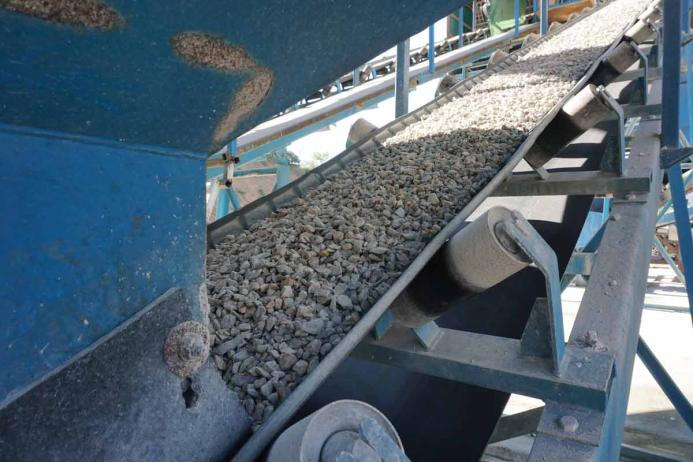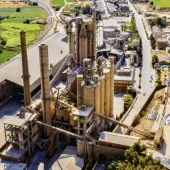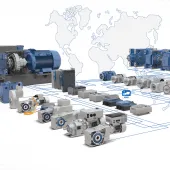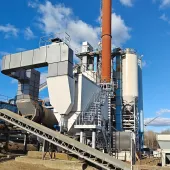Optimizing Energy Use

First published in the February 2024 issue of Quarry Management
Energy flexibility helps offset rising costs for aggregates
Businesses operating in energy-intensive sectors such as mining and quarrying, construction aggregates, and the production of cement and other building materials, have all seen significant increases in their operating costs over recent years. Typically, energy is one of the largest input costs for businesses in the aggregates sector.
More specifically, cement manufacturing has long been regarded as one of the hardest industrial activities to abate, with energy comprising a considerable proportion of operating costs – typically 110kWh per tonne of end product. According to CEMBUREAU, the European Cement Association, recent hikes in energy prices now threaten to triple the cost of producing cement in the EU.
Controlling energy costs is not the sector’s only challenge. Mining alone accounts for approximately 4% to 7% of global greenhouse gas emissions. This is a significant contribution from a single industry, the success of which is also vital to the transition to a low-carbon economy. The World Bank forecasts a 500% surge in demand for metals and minerals to meet Paris Climate Agreement goals.
For major energy users in this sector, the case for lowering energy use has never been more compelling; reducing consumption by a few percentage points can add up to substantial savings. A key challenge is to manage costs while limiting the environmental impact of their activities.
In search of new energy strategies
By now, many in the sector have already taken the ‘easy to implement’ actions to reduce energy use. Businesses are now seeking more strategic, holistic approaches that can fully optimize costs and emissions. One such approach is to take advantage of the ability to flex energy use around their operations, allowing them to participate in the Capacity Market (CM) through demand response (DR) and grid-balancing programmes.
Demand response has become a vital tool for many grid operators as they seek to balance their energy systems by controlling the demand side at times of grid stress. Companies processing hundreds of thousands of tonnes of materials each year have significant potential to turn off or turn down machinery, removing large power loads from the grid. With their ability to offer megawatts of demand-side capacity, such businesses are an excellent fit for DR programmes, and many have successfully participated in these schemes for several years.
Cement manufacturers, for example, combine both batch and continuous production techniques that use large, energy-intensive machines to crush and mill stone during normal working hours, while operating kilns 24h a day, seven days a week to produce clinker. Manufacturing cement in batches results in intermittent but predictable power demand from plant. Heavy plant such as ball mills, which consume significant amounts of power, can be shut off quickly without impacting onward processes. These process characteristics provide considerable scope to participate in flexibility schemes which generate valuable revenue, by responding to grid operators’ requests to reduce demand.
At the same time, with such energy-intensive production processes, the cement industry is a significant carbon emitter, contributing about 8% of planet-warming emissions. The industry is, therefore, under pressure to cut costs while undergoing its own decarbonization journey.

Realizing energy flexibility benefits
Any mining or quarrying company that can flex their demand by turning down or turning off plant or machinery can generate a revenue stream to help offset their energy costs, by being available to participate in demand response.
The Capacity Market is a common scheme for aggregates businesses to take part in, with availability revenue paid based on the business’ curtailable load. Typically, teams of experts monitor communications from the grid operator and notify customers of potential CM events, giving them the option to participate. The CM notice period can vary in each market but is generally long enough to give participating companies time to inform staff before turning off participating machines (eg 1h notice in Ireland; 4h in GB). If it is inconvenient for a business to participate in any specific event, options are available to opt out.
Businesses can also participate in frequency response programmes which require a faster response time, usually within 30s, triggered by a drop in the oscillation of AC current below the grid’s licence commitment (49.7Hz in GB). In such an event, bespoke technology can automatically shut down designated assets, albeit with the site’s control system always retaining overriding control. The available services for frequency response vary between GB and Ireland energy markets, but generally faster response times are rewarded with higher payments. As a result of this, some businesses are investing in battery storage, which supports the fastest response times. Battery storage can also deliver additional power resiliency to the site and be paired with on-site renewable generation, to create a microgrid.

A solution in action
One of Enel X’s clients is a global aggregates conglomerate with cement plants in GB and Ireland that produce up to 2.3 million tonnes annually. Participating in grid flexibility schemes forms a core part of the company’s energy-management strategy, enabling it to minimize manufacturing costs while supporting its objective to reduce CO2 emissions per tonne of cement-based product by 30% by 2030.
“Clear parameters for participation in grid flexibility services include maintaining operational continuity, maximizing financial benefit, and reducing environmental impact….
The company already has flexibility built into its cement production, making it an ideal candidate for grid flexibility services. Many of the most energy-intensive processes, such as stone crushing and milling, are operated in batches, resulting in intermittent but predictable power demand. Additionally, the company’s sites are already equipped with modern building- and plant-management systems, enabling assets to react within seconds to deliver grid services.
The company saw an opportunity to leverage this inherent manufacturing flexibility to enrol its GB and Ireland cement plants both in Capacity Markets and in frequency response. Enel X worked closely with the company to understand its business processes, goals, and aspirations. Their deep experience of energy usage, markets, and mechanisms – combined with a strong partnership culture – enabled them to identify clear parameters for the company’s participation in flexibility initiatives, thereby maintaining operational continuity, maximizing financial benefit, and reducing environmental impact.
Participating in flexibility services has provided the company with a low-risk solution to reduce both operational costs and carbon emissions, while meeting its goals as a good grid citizen and a sustainability champion. Revenue from participation in the Capacity Market and frequency response programmes offsets 3.2% of the annual energy spend at the company’s Irish cement plant alone.
“At one Irish cement plant, revenue from Enel X’s flexibility services offsets 3.2% of annual energy spend….
Realizing the benefits
Typically, companies that join demand or frequency response schemes do not need to make capital investments and are not penalized if operational requirements mean they are unable to participate in a specific event. In practice, while they are paid to be available to respond, businesses are invited to take part in only a handful of events each year.
Some businesses use such events as an opportunity to undertake essential maintenance, ensuring that when plant is shutdown, the time is used to deliver additional benefits.
Limiting operations during periods when the grid is experiencing high demand contributes to the stabilization of energy supplies across the network, helping keep the lights on for local homes and businesses. Moreover, reducing pressure on the grid can avoid powering up fossil fuel plants to meet excess demand, and enable greater deployment of renewables, further cutting carbon emissions. Indeed, many participants see their demand response activities as an integral part of their sustainability efforts, by improving their environmental and social impact.

Navigating the process
Managing energy and demand response opportunities may not be a core business skill within aggregates companies, so using a third-party expert to navigate the process, develop a tailor-made plan, and ensure regulatory compliance is advisable.
To enable client enrolment, Enel X first carry out the technical process of gaining market access. They then facilitate the initial installation of bespoke equipment and technology at the sites involved, to ensure the assets can support the grid. Enel X’s accurate forecasting and high-quality data allow clients to plan operations in advance, avoiding the risk of penalties. Finally, Enel X take care of reporting and settlement, down to 20 millisecond granularity.
Taking a managed approach ensures that the demands from the grid are balanced with customers’ operational requirements with minimal input required, thereby minimizing impact on operations and maximizing financial benefit.
Maintaining competitive advantage
Energy dominates input costs for many businesses, not least energy-intensive sectors such as mining and aggregates. Participating in demand response and frequency response provides important revenue streams that help offset energy costs – even more important to those GB companies potentially facing higher transmission network charges since the Triad settlement periods ceased in April 2023.
Minimizing manufacturing costs, and hence the cost per tonne of outputs, is key to enabling businesses’ competitive advantage. As well as providing financial benefits, energy flexibility supports sustainability efforts, as greater flexibility is key to reducing reliance on fossil fuels, while accommodating more renewables on the grid.
Subscribe to Quarry Management, the monthly journal for the mineral products industry, to read articles before they appear on Agg-Net.com








